Wireless Sound Monitoring
If you are looking for a wireless sound monitoring system that helps you and your team eliminate manual logging, improve compliance readiness, and protect all your temperature-sensitive assets, you’ve arrived at the right place.
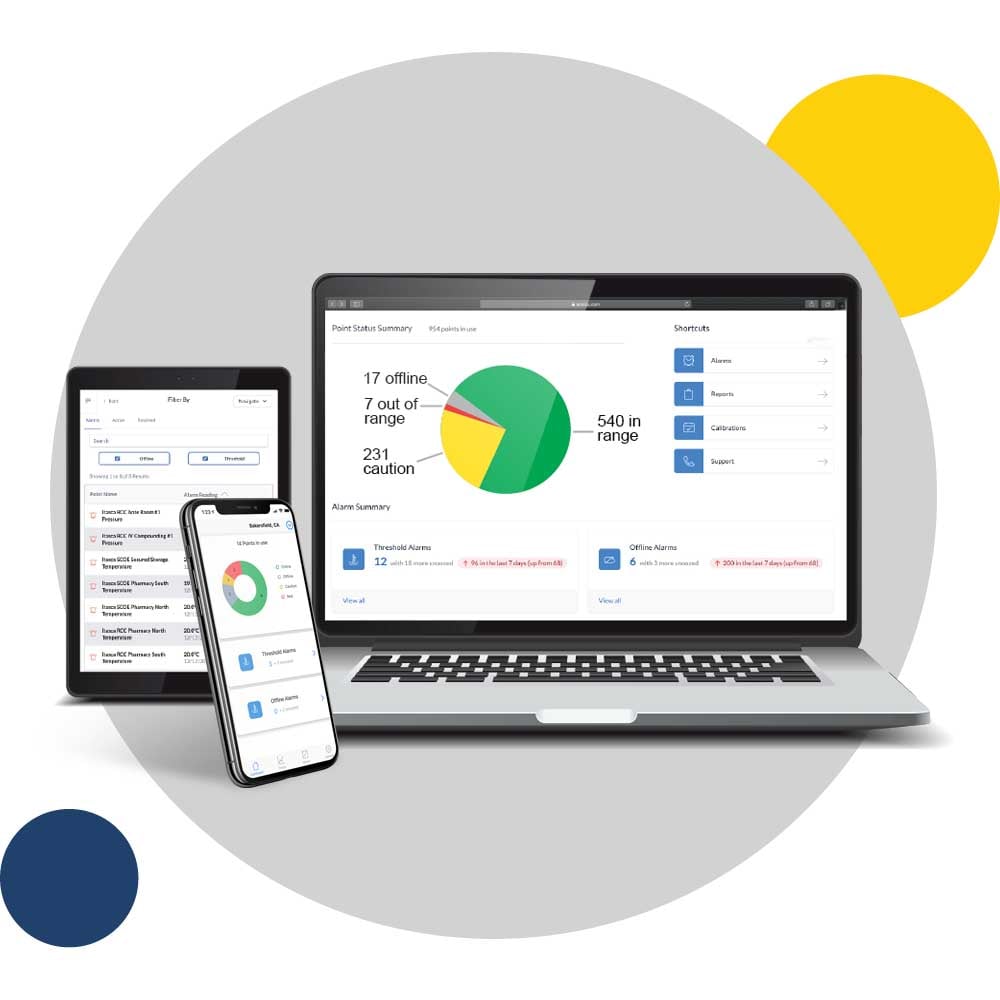
Let us help you evaluate your needs!
- Safety: Alerts via text, email, push notifications and phone calls to protect your precious assets
- Compliance: Automated compliance reports
- Efficiency: Reduced Manual Logging and time spent on reports
And what makes us different?
- Lifetime Warranty: Never buy hardware again!
- Unlimited Users: Scale across your entire organization
- Connectivity Flexibility: Wi-Fi, Cellular or Data Hub
- Phone call alarms: Alerts won't get ignored
- Mobile App: 500 Freezers in your pocket
- Facility monitoring: Simple to add water leak, door open, occupancy, and even IAQ monitoring
Engineered in Indiana with U.S.-based support.
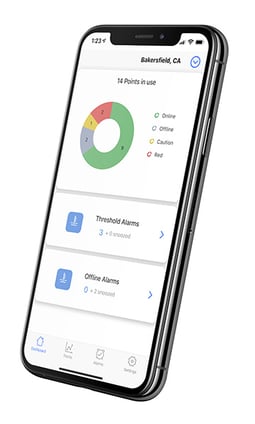
See What Customers Say About Sonicu
Asset Protection. Compliance Automation. And Reduced Manual Processes.
Sonicu serves thousands of professionals at hundreds of organizations across North America by improving how they monitor and manage their most sensitive assets and environments.
Professionals from healthcare, life science, laboratory and cold chain facility management turn to Sonicu to help them improve the way they do business.
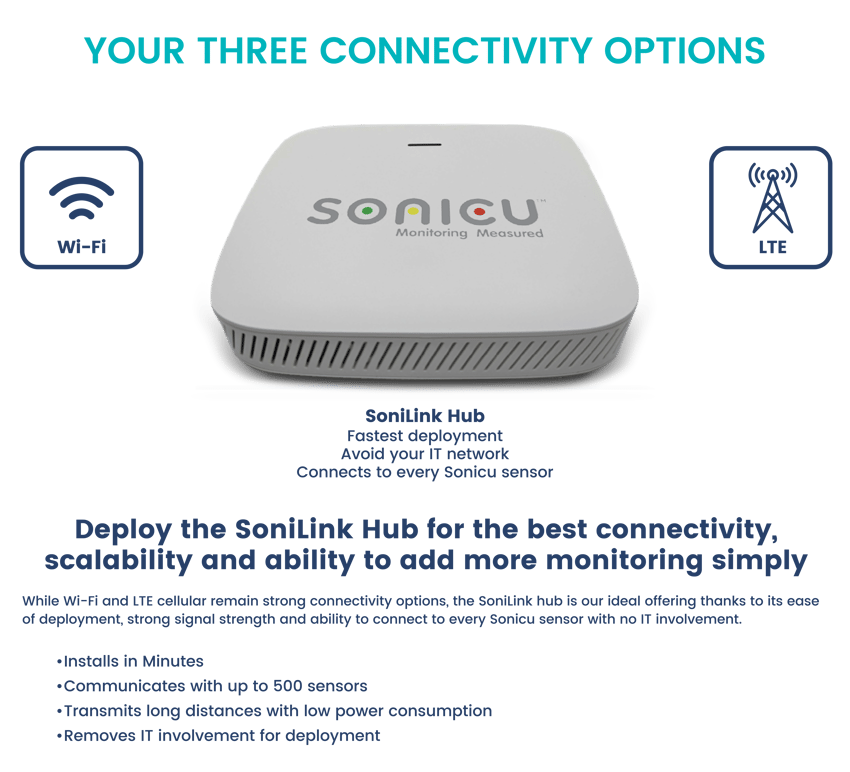
How IU Health
consolidated all of its pharmacy monitoring needs
into one cloud-based platform serving dozen of locations.
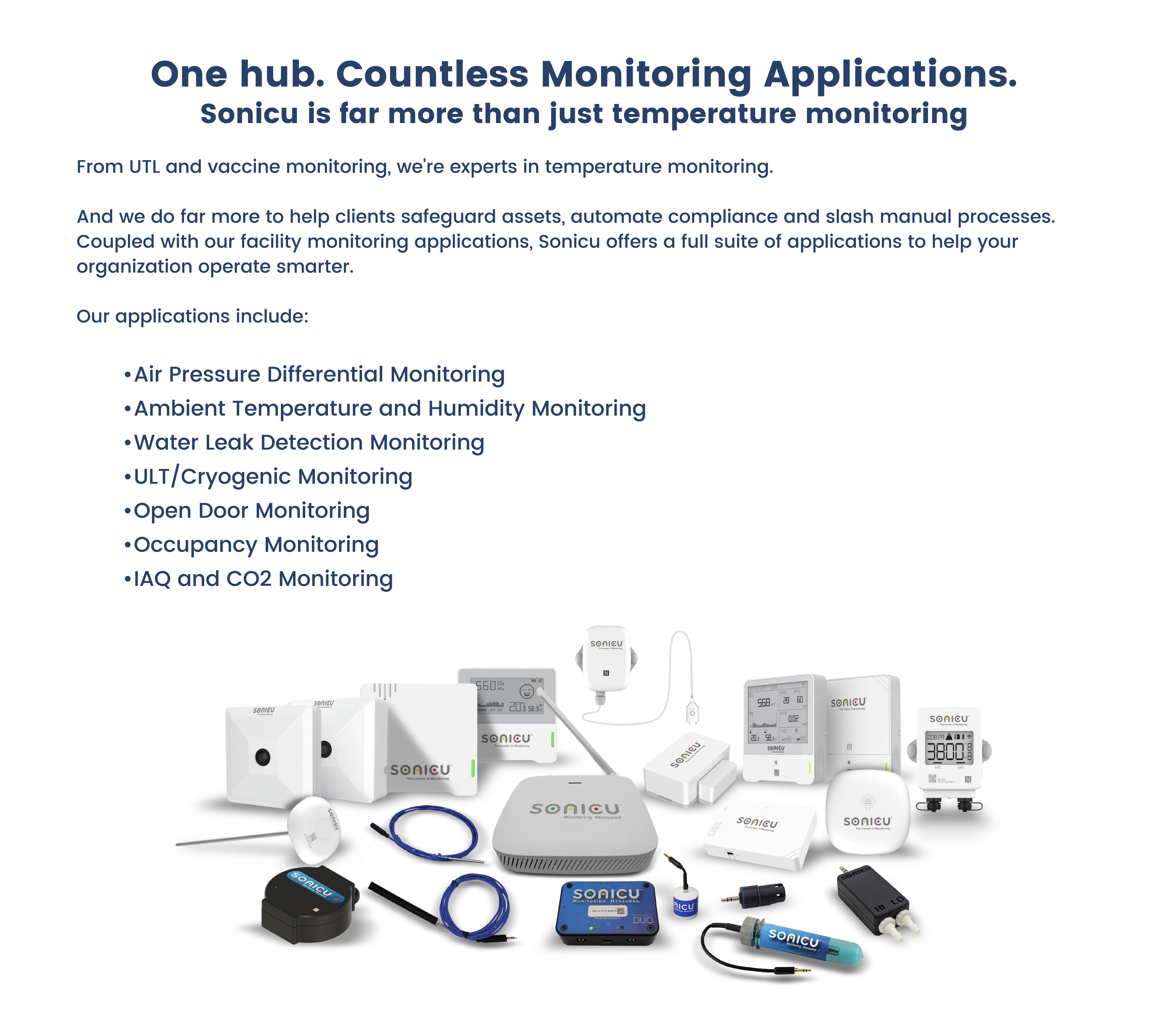
Streamlining Industry Standards: The Unmatched Impact of Wireless Sound Monitoring
Some of the finest names in healthcare, including Indiana University Health, the University of Michigan Health System, and Stanford University, rely on Sonicu to provide a robust and continuous environmental monitoring system, including temperature, humidity, air pressure, and more.
These respected healthcare and research brands turn to Sonicu for four primary reasons:
- Real-Time Monitoring: the sensors collect temperature, humidity, air pressure data and more, and transmit it wirelessly to SoniCloud - our cloud-based platform.
- Operational Efficiency: Virtually eliminate the need for tedious and costly manual logging
- Compliance Automation: Respond to any regulatory audit or inspection in a few clicks with our reports section
- Asset Protection: Detect and respond to any threshold that can threaten anything perishable: food, drugs, vaccines, research, etc.
Our customers stay with us thanks to our American-based customer support, which is never more than a phone call away. While our technology is intuitive and powerful, we know it’s only as strong as the people who stand behind it.
Wireless sound monitoring is a sophisticated technology that employs wireless devices to capture, analyze, and manage sound levels in various environments. This process is integral to ensuring the safety, efficiency, and compliance of operations in industries where sound levels can have significant implications, such as Neonatal Intensive Care Units (NICUs), manufacturing or factory sites, healthcare facilities' critical care sections, construction sites, and other sound-sensitive environments.
There are numerous reasons why wireless sound monitoring is considered a critical necessity in these applications.
First, in virtually any workplace, excessive noise can pose serious health risks to workers, including hearing loss and stress-related illnesses. Wireless sound monitoring helps ensure compliance with health and safety regulations by continuously monitoring noise levels, and alerting managers when sound levels exceed safe thresholds.
In NICUs and critical care sections, maintaining an environment with controlled noise levels is also crucial for patient recovery and well-being. Excessive noise can interfere with the healing process, stress patients, and in the case of NICUs, affect the development of newborns. Wireless sound monitoring allows for the continuous oversight of noise levels without disturbing the patients, ensuring a conducive healing environment.
In factories and other production environments, noise levels can also affect worker concentration and communication, leading to decreased productivity and increased error rates. By monitoring sound levels, organizations can implement changes to reduce noise pollution, thereby improving worker efficiency and the overall productivity of the operation.
For industries that operate in or near residential areas, monitoring and managing noise pollution is critical to maintain good community relations and comply with local noise ordinances. Wireless sound monitoring enables these industries to assess their environmental impact in real-time and take necessary actions to mitigate excessive noise.
The impact on day-to-day operations concerning these nifty devices is immense.
To begin with, wireless sound monitoring systems contribute to safer work environments by helping prevent hearing loss and reducing the risk of accidents that can occur when workers are unable to hear warning signals or communications due to excessive noise.
Continuous monitoring and data logging provided by these systems also help organizations demonstrate compliance with noise regulations, potentially reducing the risk of fines and liability for non-compliance.
By identifying sources of excessive noise, companies can take targeted actions to reduce noise levels, such as modifying equipment or changing workflow processes. This leads to a more pleasant and productive work environment.
The data collected by wireless sound monitoring systems can be used to make informed decisions too regarding workplace layout, equipment placement, and the scheduling of noisy operations to minimize their impact on workers and sensitive environments.
Lastly, the ability to receive real-time alerts when noise levels exceed predefined thresholds allows for immediate action to mitigate excessive noise, further ensuring the safety and comfort of individuals in sound-sensitive environments.
Our customers such as Exide Technologies are proud users of Sonicu’s ecosystem. Using Sonicu’s ecosystem you have access to all the products below:
- SoniLink Hub: Hardware for connectivity
- SoniShield: Hardware and Software to protect assets
- SoniCloud Platform: Our proprietary software where users interact with their instance
- Digital Sensors & Probes: Hardware (probes and sensors) in the cold/frozen environments
Wireless sound monitoring plays a pivotal role in various industries by ensuring health and safety compliance, enhancing patient care, improving operational efficiency, and managing environmental impacts. Its integration into day-to-day operations leads to safer, more efficient, and more compliant work environments, ultimately benefiting both organizations and the individuals they serve.
You can learn more about how our software helps compliance professionals in these case studies:
Problem: Pharmacy Suffered Too Much Humidity In New Wing, impacting Compounding Pharmacy
Solution: Affordable Humidity Monitoring that Delivered Powerful data to prompt contractors to fix improperly sized air handler
Problem: The dining department struck with regulatory violations
Solution: Enterprise-wide monitoring that automates regulatory compliance across all departments
Problem: Release of lead particles in battery projects
Solution: Mobile, affordable air pressure monitoring solution
What are the key components of wireless sound monitoring?
Wireless sound monitoring systems have several key components that work in tandem to capture, analyze, and report sound levels across various environments. These systems leverage a combination of technologies to perform their functions efficiently, ensuring accurate monitoring and management of noise levels.
- Microphones and sensors
- These are the primary devices for capturing sound. Advanced microphones and sensors are designed to accurately measure sound pressure levels across a wide range of frequencies.
- They often use piezoelectric sensors or MEMS (Micro-Electro-Mechanical Systems) technology for precise sound detection.
- Wireless transmitters
- Once sound is captured, it needs to be transmitted to a central system for analysis.
- Wireless transmitters send the data collected by microphones and sensors to a receiver or directly to a cloud-based platform.
- These transmitters utilize wireless communication protocols such as Wi-Fi, Bluetooth, Zigbee, or cellular networks to ensure timely and secure data transmission.
- Data processors and analyzers
- This component processes and analyzes the sound data to determine sound levels, patterns, and potential compliance issues.
- Utilizes DSPs (Digital Signal Processors) and sophisticated algorithms to filter, analyze, and interpret sound data.
- Data storage and management systems
- Stores the collected sound data for historical analysis, reporting, and compliance documentation.
- Can be based on local servers or cloud storage solutions, leveraging database management systems to organize and manage the data efficiently.
- User interface (UI)
- Allows users to interact with the system, set thresholds, review data, and receive alerts.
- Often web-based or mobile applications that provide real-time data visualization, customizable dashboards, and notification systems.
- Notification and alert systems
- Notifies users when sound levels exceed predetermined thresholds or when specific sound patterns are detected.
- Utilizes SMS, email, or app-based notifications powered by rule-based engines that trigger alerts based on the analyzed data.
- Internet of Things (IoT)
- Wireless sound monitoring systems are often part of the IoT ecosystem, allowing for seamless integration with other monitoring and management systems.
- Cloud computing
- Provides scalable data storage, processing power, and advanced analytics capabilities, facilitating the management of large datasets and enabling remote access to the system from anywhere.
- Edge computing
- For real-time processing, some systems use edge computing to analyze data directly on the device or nearby, reducing latency and bandwidth usage.
By integrating these components and technologies, wireless sound monitoring systems offer a comprehensive solution for monitoring and managing sound levels efficiently across various industries and environments. This integration ensures not only compliance with regulations but also the protection of individuals’ health and well-being, alongside operational efficiency and productivity improvements.
You can learn more about how our software helps compliance professionals in these case studies:
Problem: Needed to reduce time to complete HACCP compliance reports
Solution: Self-install of temperature monitoring for compliance automation
Problem: Needed pharmacy temperature monitoring following refrigerator loss across many remote clinics:
Solution: Simple Sonicu installation and configuration simplified standing-up remote systems
Indiana University Health: Enterprise Hospital For Temp, Humidity, Air Pressure
Problem: Server Based Monitoring lacking Enterprise Visibility
Solution: One Window into all monitoring across dozens of facilities
What are the pain points that wireless sound monitoring effectively resolves?
Wireless sound monitoring systems address several critical pain points across different industries, particularly in environments where noise levels can significantly impact health, safety, and operational efficiency. By leveraging advanced technologies, these systems offer effective solutions to some of the most challenging issues related to sound management.
Pain Point: Ensuring compliance with local, national, and international noise regulations can be challenging, especially in industries like construction, manufacturing, and entertainment.
Solution: Wireless sound monitoring systems provide precise, real-time data on noise levels, enabling organizations to demonstrate compliance with regulations and avoid fines or legal action.
Pain Point: Prolonged exposure to high noise levels can lead to hearing loss, stress, and other health issues for workers, affecting their well-being and productivity.
Solution: Continuous monitoring helps identify areas or processes that exceed safe noise levels, allowing for immediate corrective actions such as implementing quieter machinery or personal protective equipment to protect workers' health.
Pain Point: In settings like hospitals (especially NICUs) and schools, maintaining ambient noise levels is crucial for the well-being and development of patients and students.
Solution: Wireless sound monitoring systems can ensure that noise levels remain within acceptable thresholds, enhancing the environment for sensitive populations.
Pain Point: Excessive noise can interfere with communication among workers and concentration, leading to decreased productivity and an increase in errors or accidents.
Solution: By identifying and mitigating sources of noise, organizations can improve the work environment, leading to enhanced efficiency and safety.
Pain Point: Industries operating near residential areas are often under scrutiny for their environmental impact, including noise pollution, which can affect their relationship with the community and lead to restrictions.
Solution: Monitoring and managing noise emissions proactively can help maintain good community relations and ensure operational activities do not disrupt the local environment.
Pain Point: Without concrete data, making informed decisions about how to manage noise levels and improve operations can be difficult.
Solution: Wireless sound monitoring systems offer detailed analytics and reporting features, providing insights that guide strategic decisions, from equipment placement to operational scheduling.
Pain Point: Responding to noise level breaches in a timely manner is challenging without continuous monitoring.
Solution: Systems that provide real-time alerts and can even trigger automated responses (e.g., adjusting machinery settings) help prevent prolonged exposure to harmful noise levels.
Companies such as Hancock Regional Hospital have trusted Sonicu to provide them with peace of mind when it comes to temperature monitoring. Other benefits they receive by choosing Sonicu include:
- Asset Protection: Get alerts when a freezer is malfunctioning to protect assets like medicines, vaccines, blood, research, sperm/eggs
- Compliance Automation: Creates simple reports to satisfy local/state/federal regulations
- Operational Efficiency: Spend less time capturing data manually: Both temps/conditions and reporting
By addressing these pain points, wireless sound monitoring systems not only enhance regulatory compliance and operational efficiency but also contribute significantly to the health and safety of individuals, the satisfaction and productivity of workers, and the overall quality of life in communities surrounding noise-generating activities. Their ability to provide real-time, actionable insights makes them indispensable tools in sound-sensitive industries and environments.
Key benefits of wireless sound monitoring
- Wireless systems provide real-time data on sound levels, enabling immediate responses to potential issues or regulatory breaches. This feature is crucial for preventing prolonged exposure to harmful noise levels and ensuring swift action to mitigate excessive noise.
- By continuously monitoring noise levels, these systems help protect employees and residents in nearby communities from the adverse health effects of excessive noise, such as hearing loss, stress, and sleep disturbance. This proactive approach to noise management contributes to a healthier, safer environment.
- Wireless sound monitoring simplifies compliance with noise regulations by automatically logging noise levels over time. This data can be used to demonstrate compliance with local, national, and international standards, reducing the risk of fines and legal issues.
- Identifying sources of noise can lead to targeted interventions, such as machinery adjustments or changes in operational practices, which can reduce noise levels and improve the working environment. A quieter environment enhances worker communication and concentration, leading to increased productivity and efficiency.
- Implementing wireless sound monitoring can lead to significant cost savings by avoiding regulatory fines, reducing health-related absences and compensation claims, and optimizing operations for better efficiency and lower noise production.
- By managing noise pollution, organizations can minimize their environmental footprint and maintain better relations with the surrounding community. This is especially important for industries located near residential areas, where excessive noise can lead to complaints and restrictions on operations.
- The data collected by wireless sound monitoring systems can provide valuable insights into noise patterns, sources, and impacts. This information can inform strategic decisions related to facility layout, equipment purchase and maintenance, and operational scheduling.
- Wireless systems can be easily scaled and adapted to different environments and requirements. Additional sensors can be integrated as needed, and the system can be configured to meet the specific monitoring needs of various industries and settings.
- Cloud-based data storage and management allow for remote access to noise monitoring data and alerts. This means that decision-makers can manage noise levels and respond to issues from anywhere, enhancing flexibility and responsiveness.
- Beyond compliance and safety, reducing noise pollution contributes to a more pleasant work environment, which can improve employee satisfaction and retention. A quieter environment is less stressful and more conducive to high-quality work.
In addition to aiding refrigeration temperature monitoring, Sonicu plays a vital role for organizations in other industries such as Ohio University and others including:
- Healthcare: Nurses respond to our alerts to keep your medicine safe
- Life Science/Lab: Lab directors rely on our alerts to protect priceless research
- Universities: Research and science department heads rely on our alerts to keep research and classroom labs safe.
- Food Service: Food distributors rely on our tech to protect your dinner
Empower Your Environment with Sonicu: The Future of Wireless Sound Monitoring Unveiled
In wrapping up our discussion on the pivotal role of wireless sound monitoring in enhancing safety, ensuring regulatory compliance, and boosting operational efficiency across various industries, it becomes evident that the right solution can revolutionize the way organizations approach sound management. Sonicu stands out as a beacon in this realm, offering an unparalleled suite of features designed to meet the unique challenges of sound-sensitive environments.
Sonicu's wireless sound monitoring system is not just about monitoring; it's about empowering your organization with advanced tools to create a safer, more compliant, and efficient environment. With features like real-time alerts, automated reports, and reduced manual logging, Sonicu addresses the critical needs of industries ranging from healthcare to manufacturing, ensuring that safety and compliance are always at the forefront.
What sets Sonicu apart is its commitment to excellence and innovation:
- Lifetime warranty ensures your investment is protected, eliminating the need for future hardware purchases.
- Unlimited users have the capability to allow for scalability across your organization, ensuring everyone is informed and empowered.
- Connectivity flexibility, with options for Wi-Fi, Cellular, or Data Hub, guarantees that you're always connected, regardless of your environment.
- Phone call alarms ensure that alerts cannot be ignored, enhancing the safety of your assets.
- A mobile app that puts the power of sound monitoring in your pocket, offering unprecedented convenience and control.
- All-American-made and supported products guarantee quality and reliability, backed by a team that understands your needs.
- Sonicu's dashboard offers comprehensive views of your monitored devices, enriched with auto-generated reports like the S.T.A.R. (Sound Achievement Report and Device Location Maps), making it easier than ever to manage your sound monitoring needs effectively.
- With 24/7 monitoring, unlimited access, and advanced alarms, Sonicu's platform is designed for those who demand the best in sound monitoring technology. The system's SMART Reporting tools and Visual Cues provide not just data, but actionable insights to help you make informed decisions that lead to positive and lasting changes in your sound environment.
Whether you're overseeing a NICU, managing a critical care environment, or mitigating industrial noise, Sonicu offers a solution that's tailored to your needs. The system's Advanced Alarming, SMART Sensors, and Flexible Transmission options ensure that your sound monitoring is precise, reliable, and versatile.
Take the step towards a smarter, safer, and more compliant environment with Sonicu. Invest in a system that grows with you, supports your goals, and provides peace of mind knowing that you're equipped with the best wireless sound monitoring technology.
Ready to elevate your sound monitoring strategy? Contact Sonicu today to explore how our cutting-edge solutions can transform your operations. Let Sonicu be the sound choice for your organization.
This isn't just sound monitoring—it's Sonicu.
American-based Customer Support: Robust & Reliable High Touch Service
Software and technology is only as good as the people who stand behind it.
At Sonicu, that means our team of American-based customer success managers who are never more than a phone call away to help field and fix any service issues.
Our probes and sensors are placed in demanding frozen environments and our software literally sends billions bits of data monthly, meaning there’s always the potential for a hiccup on either the hardware or software.
We are committed to fielding every customer service request promptly and addressing our customer’s concerns promptly and professionally.
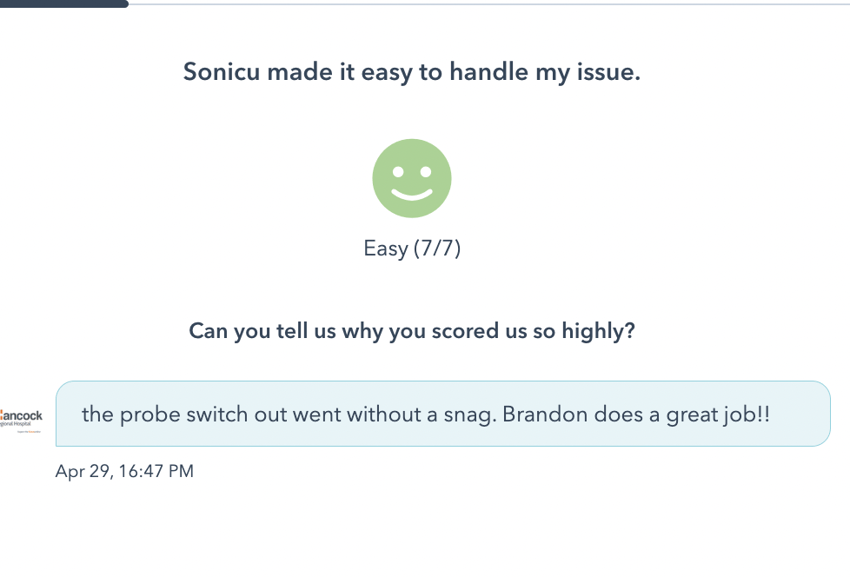
 “I like to say that every refrigerator or freezer is like a car in that they all behave a bit differently,
“I like to say that every refrigerator or freezer is like a car in that they all behave a bit differently,
and then every now and then you just get a bad boy who doesn’t want to perform as we need it to,”
Martha Rardin, Director, Nutrition and Dietetics, Hendricks Regional Hospital.
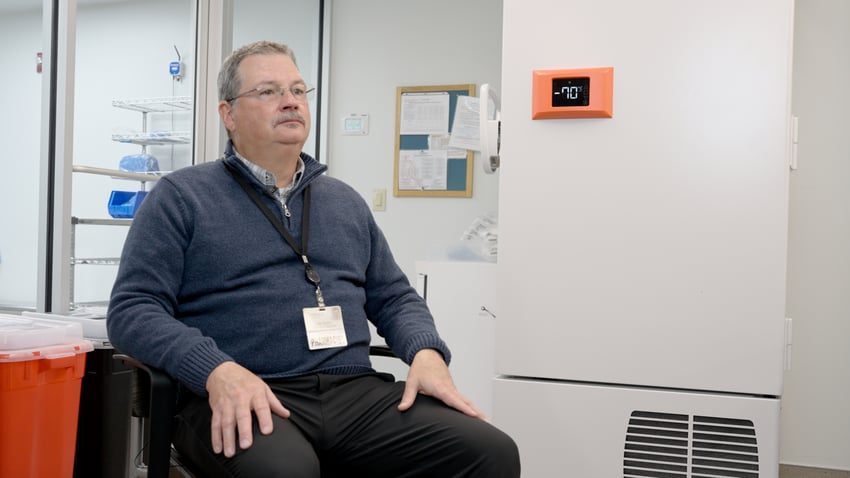 “Sonicu has been a powerful tool to identify which units are behaving out of spec and get our team
“Sonicu has been a powerful tool to identify which units are behaving out of spec and get our team
to fix them before we have a serious issue.”
Tim Livesay, Director, Hancock Regional Hospital Pharmacy Director


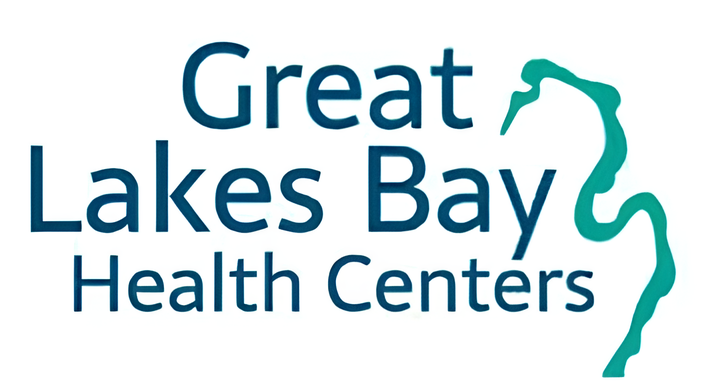

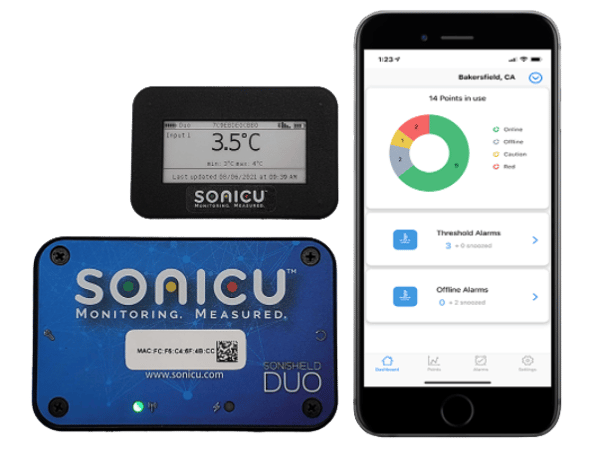
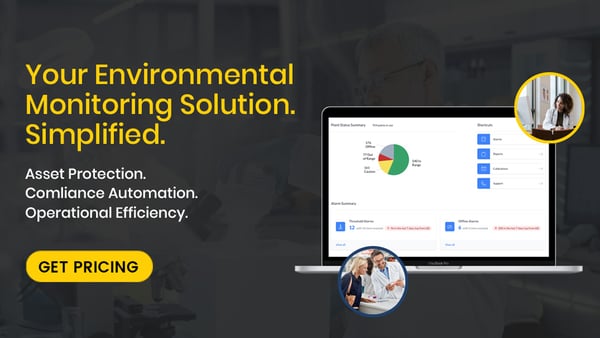
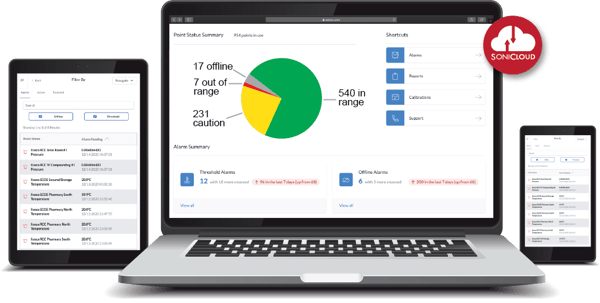


How IU Health
consolidated all of its pharmacy monitoring needs
into one cloud-based platform serving dozen of locations.